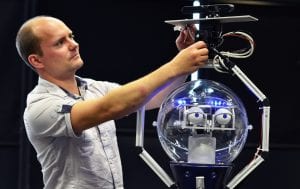Linda the robot was one of the star attractions at the high-profile Longitude Prize 2014 launch, which aims to help solve one of the greatest issues of our time.
Linda is one of six specialist mobile robots involved in the £7.2 million collaborative STRANDS project aimed at creating robots that are able to operate independently and ultimately support security guards or staff in care homes.
Based at the University of Lincoln, UK, Linda was invited to attend New Broadcasting House in London for the official launch of the Longitude Prize on Monday, 19th May.
In 1714 the British government threw down the gauntlet to solve one of the great scientific challenges of that century – how to pinpoint a ship’s location at sea by knowing its longitude.
Longitude Prize 2014 is a challenge with a multi-million pound prize fund to help solve one of the greatest challenges we’re facing today. It is being run and developed by Nesta, the UK’s innovation foundation.
Linda will be accompanied by Dr Marc Hanheide from the University of Lincoln’s School of Computer Science and Dr Nick Hawes from the University of Birmingham, who are collaborating on the STRANDS project.
Dr Hanheide, whose background is in Artificial Intelligence, is leading the research on how the robots gather information about their surroundings, and use this learned knowledge to interact appropriately with human users.
Dr Hanheide said: “It was fantastic to be asked to show off Linda at this hugely prestigious event. Two of the other robots are currently at G4S Technology in Tewksbury, UK, and the care facility Haus der Barmherzigkeit in Vienna, Austria, so we will soon be able to see how effective they are in real-world environments and use this data to develop their future learning models.”
Other partners in the STRANDS project include Royal Institute of Technology (Sweden); RWTH Aachen University (Germany); The Vienna University of Technology (Austria) and University of Leeds (UK).
Linda will be continuing her travels in June 2014, watch this space for details!
